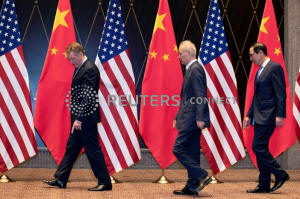China vows fight against Trump's latest tariffs as stocks sink
 Send a link to a friend
Send a link to a friend
 [August 03, 2019]
By Huizhong Wu and Alexandra Alper [August 03, 2019]
By Huizhong Wu and Alexandra Alper
BEIJING/WASHINGTON (Reuters) - China on Friday vowed to fight back
against U.S. President Donald Trump's abrupt decision to slap 10%
tariffs on the remaining $300 billion in Chinese imports, a move that
ended a month-long trade truce.
China's new ambassador to the United Nations, Zhang Jun, said Beijing
would take "necessary countermeasures" to protect its rights and bluntly
described Trump's move as "an irrational, irresponsible act."
"China's position is very clear that if U.S. wishes to talk, then we
will talk, if they want to fight, then we will fight," Zhang told
reporters in New York, also signalling that trade tensions could hurt
cooperation between the countries on dealing with North Korea.
Trump said China had to do a lot in order to turn things around in the
trade talks and repeated an earlier threat to substantially increase
tariffs if they failed to do so.
"We can't just go and make an even deal with China. We have to go and
make a better deal with China," Trump told reporters at the White House.

The U.S. president stunned financial markets on Thursday by saying he
plans to levy the additional duties starting Sept. 1, marking a sudden
end to a truce in a year-long trade war between the world's two biggest
economies that has slowed global growth and disrupted supply chains.
U.S. stocks extended their sell-off Friday on Trump's tariff
announcement. Yields on U.S. and German debt plumbed multi-year lows
amid a rush for safe-haven assets.
Earlier on Friday, Chinese Foreign Ministry spokeswoman Hua Chunying
said China was holding firm to its position in the 13-month tariff brawl
with the United States.
"We won't accept any maximum pressure, intimidation or blackmail," Hua
told a news briefing in Beijing.
"On the major issues of principle we won't give an inch," she said,
adding that China hoped the United States would "give up its illusions"
and return to negotiations based on mutual respect and equality.
Retaliatory measures by China could include tariffs, a ban on the export
of rare earths that are used in everything from military equipment to
consumer electronics, and penalties against U.S. companies in China,
according to analysts.
Trump also threatened to further raise tariffs if Chinese President Xi
Jinping fails to move more quickly to strike a trade deal.
The 10% duties, which Trump announced in a series of Twitter posts after
his top trade negotiators briefed him on a lack of progress in talks in
Shanghai this week, would extend tariffs to nearly all Chinese goods
that the United States imports.
CONSUMER IMPACT
White House economic adviser Larry Kudlow told reporters on Friday that
the impact on consumers from the latest duties would be minimal, despite
the fact that the $300 billion target list is nearly all consumer goods,
from cellphones and laptop computers to toys and footwear.
"The president's not satisfied with the progress on the trade deal,"
Kudlow told Fox Business Network.
[to top of second column]
|

U.S. Trade
Representative Robert Lighthizer points at markers on the floor as
he leads Chinese Vice Premier Liu He and Treasury Secretary Steven
Mnuchin to their position for a family photo at the Xijiao
Conference Center in Shanghai, China, July 31, 2019. Ng Han
Guan/Pool via REUTERS

Apple Inc fell more than 2% after a similar fall on Thursday on
concerns about tariffs on its core products. Bank of America Merrill
Lynch analysts said on Friday that the tariffs could reduce the tech
giant's earnings by 50 to 75 cents a share, with the bulk of that
from iPhone duties.
So far, Beijing has refrained from slapping tariffs on U.S. crude
oil and big aircraft, after cumulatively imposing additional
retaliatory tariffs of up to 25% on about $110 billion of U.S. goods
since the trade war broke out last year.
China is also drafting a list of "unreliable entities" - foreign
firms that have harmed Chinese interests. U.S. delivery giant FedEx
is under investigation by China.
"China will deliver each retaliation methodically, and deliberately,
one by one," ING economist Iris Pang wrote in a note.
"We believe China's strategy in this trade war escalation will be to
slow down the pace of negotiation and tit-for-tat retaliation. This
could lengthen the process of retaliation until the upcoming U.S.
presidential election" in November 2020, Pang said.
The tariffs may also force the U.S. Federal Reserve to again cut
interest rates to protect the U.S. economy from trade-policy risks,
experts said.
The Fed got another possible signal for a second rate cut next month
from U.S. July jobs data on Friday, which showed a slowdown in
hiring and fewer hours for manufacturing workers.
But new data also showed the U.S. goods trade deficit dipped 0.3
percent in June to $55.2 billion in a sign that Trump's tariff
policies were restricting trade flows. The goods trade deficit with
China shrank 0.8% to $30 billion with Chinese imports falling 0.7%
and U.S. exports to China unchanged.

U.S. Trade Representative Robert Lighthizer and Treasury Secretary
Steven Mnuchin briefed Trump earlier this week on their first
face-to-face meeting with Chinese officials since Trump met Xi at
the G20 summit at the end of June and agreed to a ceasefire in the
trade war.
Previous negotiations collapsed in May, when U.S. officials accused
China of backing away from earlier commitments.
(Reporting by Andrea Shalal, Alexandra Alper, Steve Holland, David
Lawder, Susan Heavey in Washington; Michelle Nichols at the United
Nations; Huizhong Wu, Xu Jing, Stella Qiu, Se Young Lee and Min
Zhang in Beijing; and Brenda Goh in Shanghai; Writing by David
Lawder and Ryan Woo; Editing by Grant McCool, Will Dunham and Sandra
Maler)
[© 2019 Thomson Reuters. All rights
reserved.]
Copyright 2019 Reuters. All rights reserved. This material may not be published,
broadcast, rewritten or redistributed.
Thompson Reuters is solely responsible for this content. |